- Home
- D. H. Lawrence
The Rainbow Page 12
The Rainbow Read online
Page 12
‘Do you want a drink?’ he asked.
She did not change. Unheeding, uncaring, she stood on the sofa, standing back, alone, her hands shut and half lifted, her face, all tears, raised and blind. And through the sobbing and choking came the broken:
‘I—want—my—mother.’
‘Do you want a drink?’ he said again.
There was no answer. He lifted the stiff, denying body between his hands. Its stiff blindness made a flash of rage go through him. He would like to break it.
He set the child on his knee, and sat again in his chair beside the fire, the wet, sobbing, inarticulate noise going on near his ear, the child sitting stiff, not yielding to him or anything, not aware.
A new degree of anger came over him. What did it all matter? What did it matter if the mother talked Polish and cried in labour, if this child were stiff with resistance, and crying? Why take it to heart? Let the mother cry in labour, let the child cry in resistance, since they would do so. Why should he fight against it, why resist? Let it be, if it were so. Let them be as they were, if they insisted.
And in a daze he sat, offering no fight. The child cried on, the minutes ticked away, a sort of torpor was on him.
It was some little time before he came to, and turned to attend to the child. He was shocked by her little wet, blinded face. A bit dazed, he pushed back the wet hair. Like a living statue of grief, her blind face cried on.
‘Nay,’ he said, ‘not as bad as that. It’s not as bad as that, Anna, my child. Come, what are you crying for so much? Come, stop now, it’ll make you sick. I wipe you dry, don’t wet your face any more. Don’t cry any more wet tears, don’t, it’s better not to. Don’t cry—it’s not so bad as all that. Hush now, hush—let it be enough.’
His voice was queer and distant and calm. He looked at the child. She was beside herself now. He wanted her to stop, he wanted it all to stop, to become natural.
‘Come,’ he said, rising to turn away, ‘we’ll go an’ supper-up the beast.’
He took a big shawl, folded her round, and went out into the kitchen for the lantern.
‘You’re never taking the child out, of a night like this,’ said Tilly.
‘Ay, it’ll quieten her,’ he answered.
It was raining. The child was suddenly still, shocked, finding the rain on its face, the darkness.
‘We’ll just give the cows their something-to-eat, afore they go to bed,’ Brangwen was saying to her, holding her close and sure.
There was a trickling of water into the butt, a burst of raindrops sputtering on to her shawl, and the light of the lantern swinging, flashing on a wet pavement and the base of a wet wall. Otherwise it was black darkness: one breathed darkness.
He opened the doors, upper and lower, and they entered into the high, dry barn, that smelled warm even if it were not warm. He hung the lantern on the nail and shut the door. They were in another world now. The light shed softly on the timbered barn, on the white-washed walls, and the great heap of hay; instruments cast their shadows largely, a ladder rose to the dark arch of a loft. Outside there was the driving rain, inside, the softly-illuminated stillness and calmness of the barn.
Holding the child on one arm, he set about preparing the food for the cows, filling a pan with chopped hay and brewer’s grains and a little meal. The child, all wonder, watched what he did. A new being was created in her for the new conditions. Sometimes, a little spasm, eddying from the bygone storm of sobbing, shook her small body. Her eyes were wide and wondering, pathetic. She was silent, quite still.
In a sort of dream, his heart sunk to the bottom, leaving the surface of him still, quite still, he rose with the panful of food, carefully balancing the child on one arm, the pan in the other hand. The silky fringe of the shawl swayed softly, grains and hay trickled to the floor; he went along a dimly-lit passage behind the mangers, where the horns of the cows pricked out of the obscurity. The child shrank, he balanced stiffly, rested the pan on the manger wall, and tipped out the food, half to this cow, half to the next. There was a noise of chains running, as the cows lifted or dropped their heads sharply; then a contented, soothing sound, a long snuffing as the beast ate in silence.
The journey had to be performed several times. There was the rhythmic sound of the shovel in the barn, then the man returned walking stiffly between the two weights, the face of the child peering out from the shawl. Then the next time, as he stooped, she freed her arm and put it round his neck, clinging soft and warm, making all easier.
The beast fed, he dropped the pan and sat down on a box, to arrange the child.
‘Will the cows go to sleep now?’ she said, catching her breath as she spoke.
‘Yes.’
‘Will they eat all their stuff up first?’
‘Yes. Hark at them.’
And the two sat still listening to the snuffing and breathing of cows feeding in the sheds communicating with this small barn. The lantern shed a soft, steady light from one wall. All outside was still in the rain. He looked down at the silky folds of the paisley shawl.* It reminded him of his mother. She used to go to church in it. He was back again in the old irresponsibility and security, a boy at home.
The two sat very quiet. His mind, in a sort of trance, seemed to become more and more vague. He held the child close to him. A quivering little shudder, re-echoing from her sobbing, went down her limbs. He held her closer. Gradually she relaxed, the eyelids began to sink over her dark, watchful eyes. As she sank to sleep, his mind became blank.
When he came to, as if from sleep, he seemed to be sitting in a timeless stillness. What was he listening for? He seemed to be listening for some sound a long way off, from beyond life. He remembered his wife. He must go back to her. The child was asleep, the eyelids not quite shut, showing a slight film of black pupil between. Why did she not shut her eyes? Her mouth was also a little open.
He rose quickly and went back to the house.
‘Is she asleep?’ whispered Tilly.
He nodded. The servant-woman came to look at the child who slept in the shawl, with cheeks flushed hot and red, and a whiteness, a wanness round the eyes.
‘God-a-mercy!’ whispered Tilly, shaking her head.
He pushed off his boots and went upstairs with the child.
He became aware of the anxiety grasped tight at his heart, because of his wife. But he remained still. The house was silent save for the wind outside, and the noisy trickling and splattering of water in the water-butts. There was a slit of light under his wife’s door.
He put the child into bed wrapped as she was in the shawl, for the sheets would be cold. Then he was afraid that she might not be able to move her arms, so he loosened her. The black eyes opened, rested on him vacantly, sank shut again. He covered her up. The last little quiver from the sobbing shook her breathing.
This was his room, the room he had had before he married. It was familiar. He remembered what it was to be a young man, untouched.
He remained suspended. The child slept, pushing her small fists from the shawl. He could tell the woman her child was asleep. But he must go to the other landing. He started. There was the sound of the owls—the moaning of the woman. What an uncanny sound! It was not human—at least to a man.
He went down to her room, entering softly. She was lying still, with eyes shut, pale, tired. His heart leapt, fearing she was dead. Yet he knew perfectly well she was not. He saw the way her hair went loose over her temples, her mouth was shut with suffering in a sort of grin. She was beautiful to him—but it was not human. He had a dread of her as she lay there. What had she to do with him? She was other than himself.
Something made him go and touch her fingers that were still grasped on the sheet. Her brown-grey eyes opened and looked at him. She did not know him as himself. But she knew him as the man. She looked at him as a woman in childbirth looks at the man who begot the child in her: an impersonal look, in the extreme hour, female to male. Her eyes closed again. A great, scalding peace wen
t over him, burning his heart and his entrails, passing off into the infinite.
When her pains began afresh, tearing her, he turned aside, and could not look. But his heart in torture was at peace, his bowels were glad. He went downstairs, and to the door, outside, lifted his face to the rain, and felt the darkness striking unseen and steadily upon him.
The swift, unseen threshing of the night upon him silenced him and he was overcome. He turned away indoors, humbly. There was the infinite world, eternal, unchanging, as well as the world of life.
CHAPTER III
CHILDHOOD OF ANNA LENSKY
TOM BRANGWEN never loved his own son as he loved his stepchild Anna. When they told him it was a boy, he had a thrill of pleasure. He liked the confirmation of fatherhood. It gave him satisfaction to know he had a son. But he felt not very much outgoing to the baby itself. He was its father, that was enough.
He was glad that his wife was mother of his child. She was serene, a little bit shadowy, as if she were transplanted. In the birth of the child she seemed to lose connection with her former self. She became now really English, really Mrs Brangwen. Her vitality, however, seemed lowered.
She was still, to Brangwen, immeasurably beautiful. She was still passionate, with a flame of being. But the flame was not robust and present. Her eyes shone, her face glowed for him, but like some flower opened in the shade, that could not bear the full light. She loved the baby. But even this, with a sort of dimness, a faint absence about her, a shadowiness even in her mother-love. When Brangwen saw her nursing his child, happy, absorbed in it, a pain went over him like a thin flame. For he perceived how he must subdue himself in his approach to her. And he wanted again the robust, mortal exchange of love and passion such as he had had at first with her, at one time and another, when they were matched at their highest intensity. This was the one experience for him now. And he wanted it, always, with remorseless craving.
She came to him again, with the same lifting her mouth as had driven him almost mad with trammelled passion at first. She came to him again, and, his heart delirious in delight and readiness, he took her. And it was almost as before.
Perhaps it was quite as before. At any rate, it made him know perfection, it established in him a constant, eternal knowledge.
But it died down before he wanted it to die down. She was finished, she could take no more. And he was not exhausted, he wanted to go on. But it could not be.
So he had to begin the bitter lesson, to abate himself, to take less than he wanted. For she was Woman to him, all other women were her shadows. For she had satisfied him. And he wanted it to go on. And it could not. However he raged, and, filled with suppression that became hot and bitter, hated her in his soul that she did not want him, however he had mad outbursts, and drank and made ugly scenes, still he knew, he was only kicking against the pricks. It was not, he had to learn, that she would not want him enough, as much as he demanded that she should want him. It was that she could not. She could only want him in her own way, and to her own measure. And she had spent much life before he found her as she was, the woman who could take him and give him fulfilment. She had taken him and given him fulfilment. She still would do so, in her own times and ways. But he must control himself, measure himself to her.
He wanted to give her all his love, all his passion, all his essential energy. But it could not be. He must find other things than her, other centres of living. She sat close and impregnable with the child. And he was jealous of the child.
But he loved her, and time came to give some sort of course to his troublesome current of life, so that it did not foam and flood and make misery. He formed another centre of love in her child, Anna. Gradually a part of his stream of life was diverted to the child, relieving the main flood to his wife. Also he sought the company of men, he drank heavily now and again.
The child ceased to have so much anxiety for her mother after the baby came. Seeing the mother with the baby boy, delighted and serene and secure, Anna was at first puzzled, then gradually she became indignant, and at last her little life settled on its own swivel,* she was no more strained and distorted to support her mother. She became more childish, not so abnormal, not charged with cares she could not understand. The charge of the mother, the satisfying of the mother, had devolved elsewhere than on her. Gradually the child was freed. She became an independent, forgetful little soul, loving from her own centre.
Of her own choice, she then loved Brangwen most, or most obviously. For these two made a little life together, they had a joint activity. It amused him, at evening, to teach her to count, or to say her letters. He remembered for her all the little nursery rhymes and childish songs that lay forgotten at the bottom of his brain.
At first she thought them rubbish. But he laughed, and she laughed. They became to her a huge joke. Old King Cole she thought was Brangwen. Mother Hubbard was Tilly, her mother was the old woman who lived in a shoe.* It was a huge, it was a frantic delight to the child, this nonsense, after her years with her mother, after the poignant folk-tales she had had from her mother, which always troubled and mystified her soul.
She shared a sort of recklessness with her father, a complete, chosen carelessness that had the laugh of ridicule in it. He loved to make her voice go high and shouting and defiant with laughter. The baby was dark-skinned and dark-haired, like the mother, and had hazel eyes. Brangwen called him the blackbird.
‘Hallo,’ Brangwen would cry, starting as he heard the wail of the child announcing it wanted to be taken out of the cradle, ‘there’s the blackbird tuning up.’
‘The blackbird’s singing,’ Anna would shout with delight, ‘the blackbird’s singing.’
‘When the pie was opened,’ Brangwen shouted in his bawling bass voice, going over to the cradle, ‘the bird began to sing.’
‘Wasn’t it a dainty dish to set before a king?’* cried Anna, her eyes flashing with joy as she uttered the cryptic words, looking at Brangwen for confirmation. He sat down with the baby, saying loudly:
‘Sing up, my lad, sing up.’
And the baby cried loudly, and Anna shouted lustily, dancing in wild bliss:
‘Sing a song of sixpence
Pocketful of posies,
Ascha! Ascha!—’*
Then she stopped suddenly in silence and looked at Brangwen again, her eyes flashing, as she shouted loudly and delightedly.
‘I’ve got it wrong, I’ve got it wrong.’
‘Oh my sirs!’ said Tilly entering, ‘what a racket!’
Brangwen hushed the child and Anna flipped and danced on. She loved her wild bursts of rowdiness with her father. Tilly hated it, Mrs Brangwen did not mind.
Anna did not care much for other children. She domineered them, she treated them as if they were extremely young and incapable, to her they were little people, they were not her equals. So she was mostly alone, flying round the farm, entertaining the farm-hands and Tilly and the servant-girl, whirring on and never ceasing.
She loved driving with Brangwen in the trap. Then, sitting high up and bowling along, her passion for eminence and dominance was satisfied. She was like a little savage in her arrogance. She thought her father important, she was installed beside him on high. And they spanked along, beside the high, flourishing hedge-tops, surveying the activity of the countryside. When people shouted a greeting to him from the road below, and Brangwen shouted jovially back, her little voice was soon heard shrilling along with his, followed by her chuckling laugh, when she looked up at her father with bright eyes, and they laughed at each other. And soon it was the custom for the passer-by to sing out: ‘How are ter, Tom? Well, my lady!’ or else ‘Mornin’ Tom, mornin’ my Lass!’ or else ‘You’re off together then?’ or else ‘You’re lookin’ rarely,* you two.’
Anna would respond, with her father: ‘How are you, John! Good mornin’, William! Ay, makin’ for Derby,’ shrilling as loudly as she could. Though often, in response to ‘You’re off out a bit then,’ she would reply, ‘Yes, we are,
’ to the great joy of all. She did not like the people who saluted him and did not salute her.
She went into the public-house with him, if he had to call, and often sat beside him in the bar-parlour as he drank his beer or brandy. The landladies paid court to her, in the obsequious way landladies have.
‘Well, little lady, an’ what’s your name?’
‘Anna Brangwen,’ came the immediate, haughty answer.
‘Indeed it is! An’ do you like driving in a trap with your father?’
‘Yes,’ said Anna, shy, but bored by these inanities. She had a touch-me-not way of blighting the inane inquiries of grown-up people.
‘My word, she’s a fawce* little thing,’ the landlady would say to Brangwen.
‘Ay,’ he answered, not encouraging comments on the child. Then there followed the present of a biscuit, or of cake, which Anna accepted as her dues.
‘What does she say, that I’m a fawce little thing?’ the small girl asked afterwards.
‘She means you’re a sharp-shins.’
Anna hesitated. She did not understand. Then she laughed at some absurdity she found.
Soon he took her every week to market with him. ‘I can come, can’t I?’ she asked every Saturday, or Thursday morning, when he made himself look fine in his dress of a gentleman farmer. And his face clouded at having to refuse her.
So at last, he overcame his own shyness, and tucked her beside him. They drove into Nottingham and put up at the Black Swan.* So far all right. Then he wanted to leave her at the inn. But he saw her face, and knew it was impossible. So he mustered his courage, and set off with her, holding her hand, to the cattle-market.
She stared in bewilderment, flitting silent at his side. But in the cattle-market she shrank from the press of men, all men, all in heavy, filthy boots, and leathern leggings. And the road underfoot was all nasty with cow-muck. And it frightened her to see the cattle in the square pens, so many horns, and so little enclosure, and such a madness of men and a yelling of drovers. Also she felt her father was embarrassed by her, and ill-at-ease.

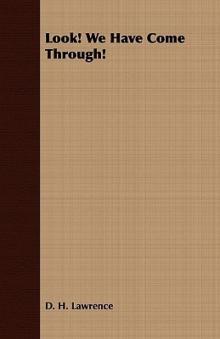 Look! We Have Come Through!
Look! We Have Come Through!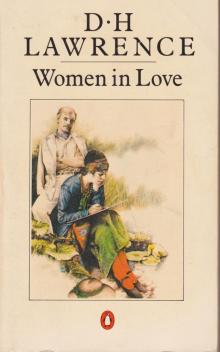 Women in Love
Women in Love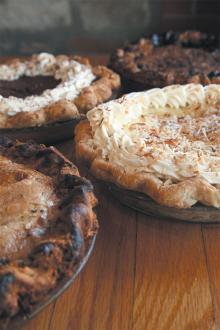 The Ladybird
The Ladybird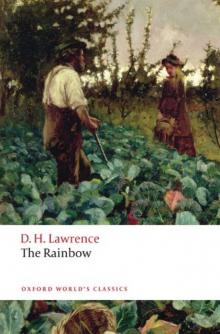 The Rainbow
The Rainbow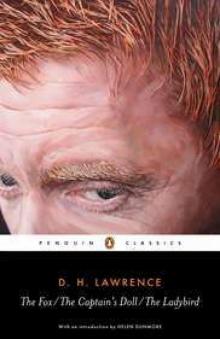 The Captain's Dol
The Captain's Dol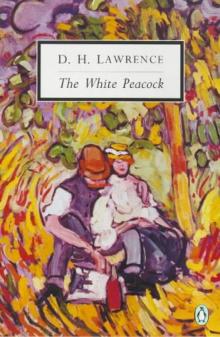 The White Peacock
The White Peacock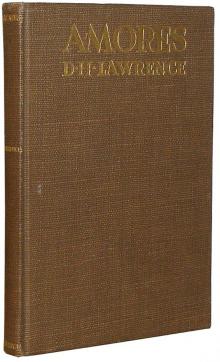 Amores
Amores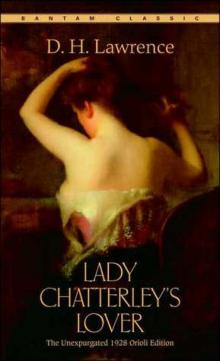 Lady Chatterley's Lover
Lady Chatterley's Lover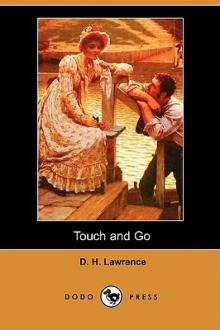 Touch and Go
Touch and Go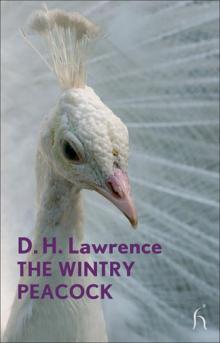 The Wintry Peacock
The Wintry Peacock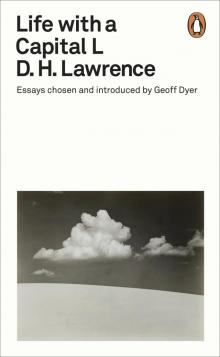 Life with a Capital L
Life with a Capital L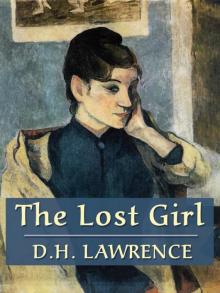 The Lost Girl
The Lost Girl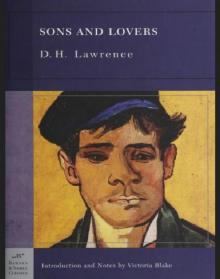 Sons and Lovers
Sons and Lovers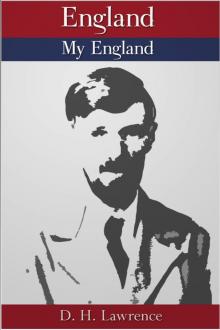 England, My England
England, My England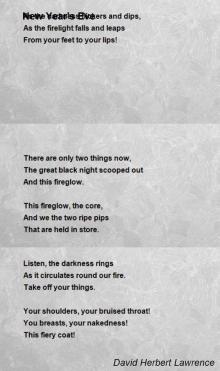 New Poems
New Poems Twilight in Italy
Twilight in Italy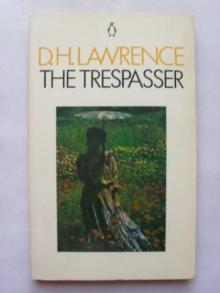 The Trespasser
The Trespasser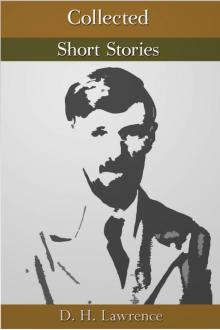 The Collected Short Stories
The Collected Short Stories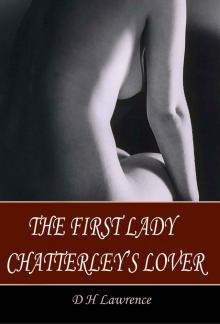 The First Lady Chatterley's Lover
The First Lady Chatterley's Lover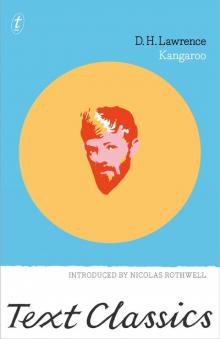 Kangaroo
Kangaroo Bay
Bay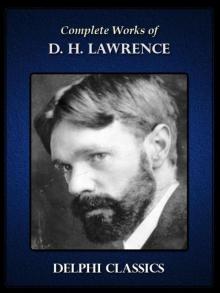 Complete Works of D.H. Lawrence
Complete Works of D.H. Lawrence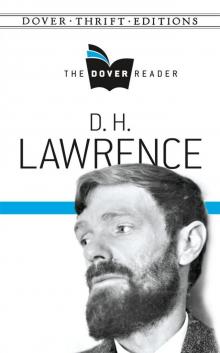 D H Lawrence- The Dover Reader
D H Lawrence- The Dover Reader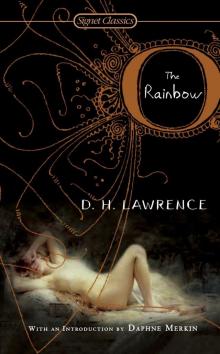 The Rainbow (100th Anniversary ed.)
The Rainbow (100th Anniversary ed.)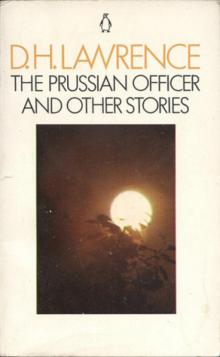 The Prussian Officer
The Prussian Officer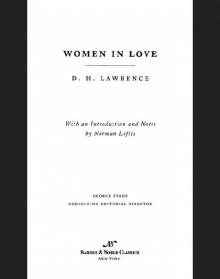 Women in Love (Barnes & Noble Classics Series)
Women in Love (Barnes & Noble Classics Series)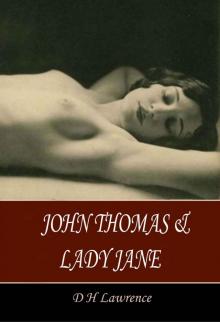 John Thomas and Lady Jane
John Thomas and Lady Jane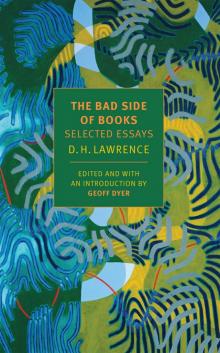 The Bad Side of Books
The Bad Side of Books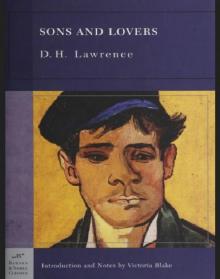 Sons and Lovers (Barnes & Noble Classics Series)
Sons and Lovers (Barnes & Noble Classics Series) Selected Stories
Selected Stories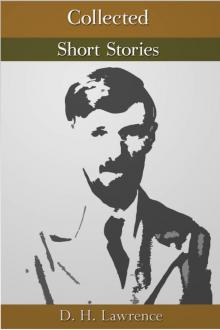 Collected Short Stories
Collected Short Stories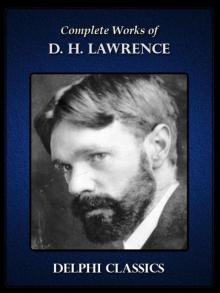 Complete Works of D.H. Lawrence (Illustrated)
Complete Works of D.H. Lawrence (Illustrated)